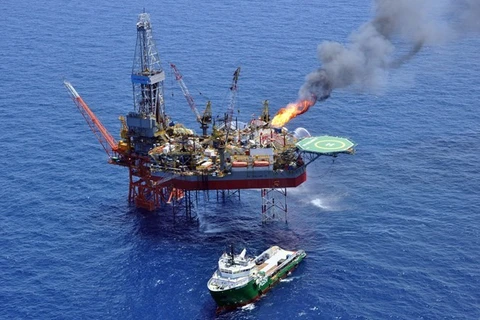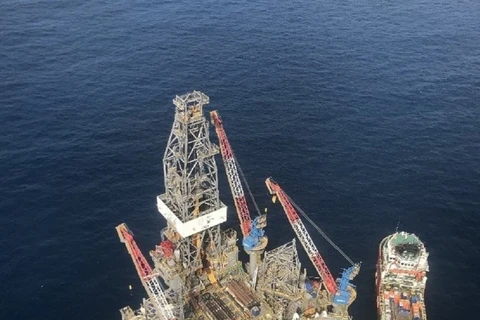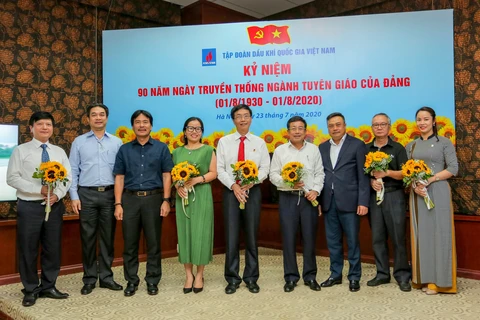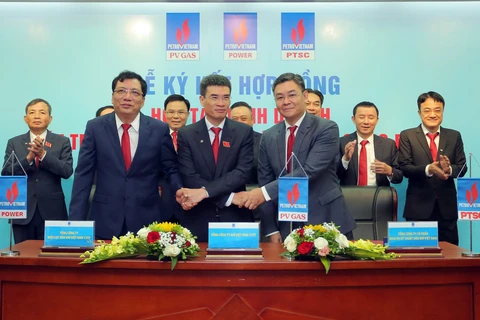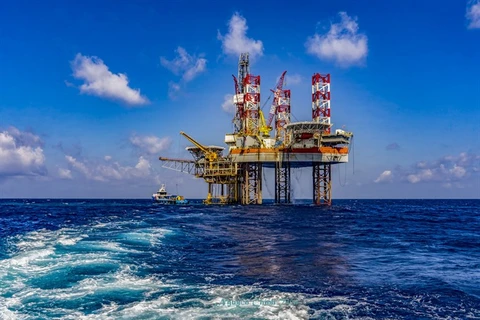Hanoi (VNA) - Despite internal and external challenges over the last five years, the Vietnam Oil and Gas Group (PetroVietnam) has managed to post upbeat results thanks to the leadership of its Party Committee.
The five-year period was marked by a range of difficulties, including falling crude oil prices, complicated issues in the East Sea, climate change, COVID-19, and PetroVietnam’s own shortcomings in terms of human resources, competitiveness, and management capacity.
In response, immediately after its second congress the group’s Party Committee promptly issued working regulations as well as resolutions on the realisation of Party policies and State law.
The Party Committee directed the shake-up of the group’s management body and the streamlining of its apparatus, while issuing a set of intra-management regulations that facilitated operations and the application of e-governance in the future.
It also prioritised improving human capacity through organising leadership courses for leading officials and managers and regular professional training for staff, as well as building educational frameworks for technicians, other staff, and managers.
Under the committee’s direction, the group invested in assessing oil and gas potential for energy reserves and other research and development activities serving production and business, with IT applications seen across all sectors of the group.
As a result, PetroVietnam’s total oil and gas exploitation was estimated at 150.3 million tonnes of oil equivalent, surpassing the target set by the Party congress’s resolution by 2 percent.
The group produced about 52.74 million tonnes of petroleum and oil and 9.72 million tonnes of urea, 1.4 percent and 23 percent higher than the target, respectively. Its urea products catered to between 70 and 75 percent of demand in Vietnam and were also exported.
Meanwhile, its electricity output reached some 128.84 billion kWh, meeting the goal set in the resolution and accounting for 10 to 12 percent of the country’s total commercial power output.
During the five-year period, the group’s revenue amounted to more than 3.5 quadrillion VND (151.64 billion USD), exceeding the goal by 6.5 percent. After-tax profit was estimated at 244.4 trillion VND, 6.3 percent higher than targeted.
The group’s services grew 9 percent, with revenue from oil and gas services hitting 895 trillion VND between 2016 and 2020.
Looking back, the Party Committee’s 2015-2020 tenure saw the group’s implementation of Politburo Resolution No 41-NQ/TW and it dealing with the most pressing challenges to date.
With Party organisations at all levels under the committee taking the central role of comprehensive leadership, the group has been steered towards better performance and actively taken part in safeguarding national sovereignty at sea. Its Party building work has improved, while its Party inspection and monitoring work were carried out more effectively and comprehensively./.
| Lessons learned from real-life operations First, the right strategic vision together with policies suitable to domestic and international conditions are key factors in seizing opportunities, optimising inner strength, boosting international cooperation, and enhancing the oil and gas business domestically. Second, the group’s Party Committee prioritises its fighting spirit, calmness, confidence, and central role to be ready for challenges and crises. Third, the principle of the Party taking the leadership in implementing political tasks and managing the group’s operation ought to be ensured. Fourth, the group will focus its resources on developing key sectors, including oil and gas exploration and exploitation; the gas industry and oil and gas processing; renewable energy; and oil and gas services in line with the Government’s directions. And Fifth, the group must continue increasing its resources, work out policies on sustainable growth, and boost inspection work to ensure it is developing in the right direction, as set by the Politburo. |


